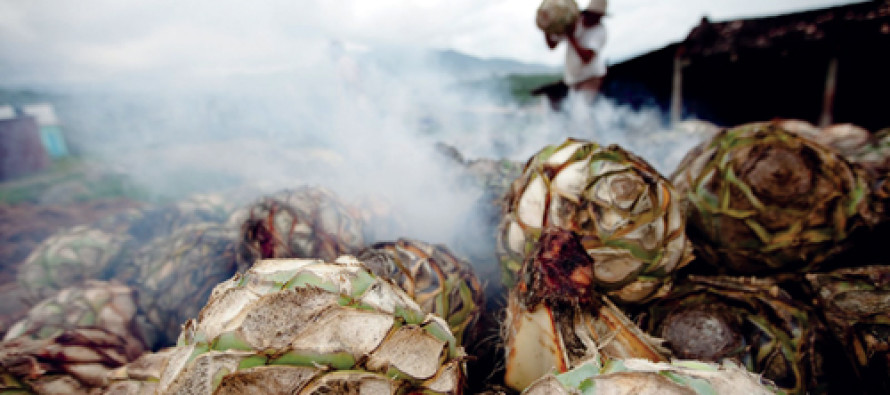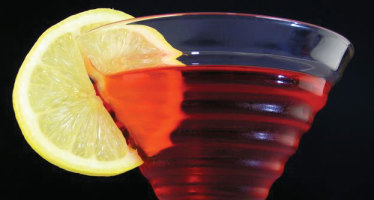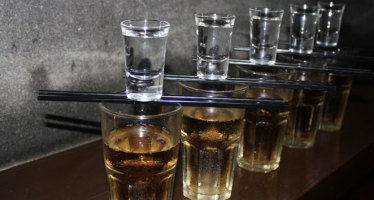Bebe Mezcal Todo Dia

“Para todo mal, mezcal, y para todo bien también.” I’m going to assume most of you chonguses don’t speak the Española, so let me put on my little translation glasses and get really close to the monitor. Ah yes, it means, “For everything bad, mezcal, and for everything good, the same”. This here is a very old saying from the Oaxaca region of Mexico, where mezcal is produced. Mezcal, the word itself, is derived from the Nahuatl word mexcalli, which means oven-cooked agave – the plant from which it is derived.
Now many moons ago, in pre-conquest Mexico, the agave or maguey plant was considered sacred and was greatly involved in all facets of Aztec culture. Its importance would subsequently skyrocket once it was discovered you could make booze out of it. Using techniques very similar to modern beer brewing practices, those Aztec fellas would ferment the sweet juice of the agave to create a potent potable called pulque. I am not a worldly fellow and thus have not ever had pulque, but the internet’s best description is, “it is the color of milk, somewhat viscous consistency and sour yeast like taste”. Wow, sounds great. I’ll be sure to put that one on the old bucket list (in that I just vomited into a bucket).
Unfortunately for the Aztecs, they were not familiar with the magic of distillation, and had to wait several centuries for the agave plant to reach its full potential. Beginning in the 16th century, the Spaniards would bring this knowledge, along with guns, germs and that dingleberry, Hernan Cortes, or as he was known to his men, Hernie. My guess is the conquistadors tried pulque and were all, “Holy CRUD, this stuff is hella nasty. Let’s make some dang liquor out of it, Hernie”. And so, it was.
What makes mezcal special, and very different from your garden variety tequila, is the manner with which it is produced. The best mezcals are made using traditional methods, basically the same way it was done over 400 years ago. First the agave is harvested and trimmed, leaving the “pina”, or heart of the plant. The pinas are then cooked in an underground kiln for several days. The kiln is a deep pit lined with stone and has a wood fire at its base. The pinas are dumped atop the fire and the pit is covered with earth. This smokes the pina and gives the mezcal its distinctly unique flavor. Once they’ve been sufficiently caramelized, they are crushed using a “tahona” which literally means “donkey mill” (I made that up). If you’ve ever seen a John Wayne movie you’ve seen a tahona. The resulting mash is fermented, distilled and yada-yada-yada.
Indeed, mezcal is true artisanal liquor, and should be enjoyed properly. In Mexico, it is drunk straight, with no ice or other liquids added. It should be considered like a fine scotch or bourbon, add ice if you find it too potent, or perhaps a few drops of water to release its bouquet. And por el amor de Dios, don’t shoot it. Don’t ask for it chilled. Don’t ask for training wheels. I will personally burn your house down if you do this.
Now that we’re clear on that, I’m going to recommend some brands for you. Well, honestly it’s really just one, Del Maguey. Del Maguey is the undisputed king of mezcal, and they have a large, diverse portfolio imported from different villages throughout Oaxaca, for which they are named. Chichicapa and Minero are my two favorites, but they’re all excellent and very easy to spot; each bottle has a beautiful depiction of the village of origin painted on the label. Do yourself a favor and try one.
There’s another really great saying about mezcal that I neglected to mention before, “From the heart of the agave, and the soul of the village”. I can’t stress enough how cool that is. You are literally drinking a small region of Mexico with every sip in a way that only wine lovers could understand. Even if you don’t like it, you damn well better respect the work that went into it. From el jimador to the el palenquero and all los trabajadores in between, Mezcal is truly a craft spirit. These days ingenuity quickly capitulates to industry, so mezcal is a rarity indeed. I implore you to enjoy it while it lasts.

Lucas Korth
Lucas Korth has been writing for Food & Spirits Magazine for probably over a handful of issues. Longevity is his greatest strength. He enjoys cycling, baseball, his wife Becky and their cat, Mr. Jingles. If you'd like to tell him his articles stink in person, he can often be found at Jake's Cigars in Benson; where he is the bar manager. He is remarkably unfunny.
Related Articles
Omaha’s Best Cosmopolitans
Ask any woman what her favorite cocktail is, and chances are she’ll say the Cosmo. A Cosmopolitan is a delicious
Five Places to get Bombed – Sake Bombed!
The simple yet effective combination of dropping a shot of sake into an imported Japanese beer creates a wonderful shooter
Eating, Drinking & Biking Around Omaha
Oh, the bicycle. There is no nobler method of transport; its awe-inspiring grace only surpassed by unparalleled precision, and such
No comments
Write a commentOnly registered users can comment.














